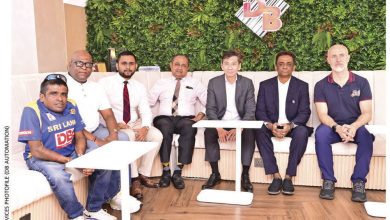UNILEVER
Q: What makes Unilever a people-centric company globally?
Anuradha Razdan: Nurturing our people is in our DNA. As a consumer goods company, we strive to deeply understand our consumers and create much loved brands that touch their lives.
Being consumer-centric naturally makes us employee-centric. In South Asia, we have 31 factories, 25,000 employees and an outer core of over 200,000 people. Our success relies on the strength and dedication of our people, and we believe that by taking care of them, they will take care of our business.
Ensuring the safety, health and wellbeing of our employees is of utmost importance to us. We empower our workforce to take ownership of their own wellbeing through various programmes such as the Mental Health Champions programme where we train our employees.
At Unilever, we also believe that leaders build leaders. Over decades, we have cultivated leaders who went on to shape future generations of leaders. We develop people’s capabilities for big, fulfilling and diverse roles.
The best example is our flagship management trainee programme – Unilever Future Leaders. Designed with a strong focus on maximising learning and growth, we ensure that we never disrupt this programme simply to fill business vacancies. This unique approach sets us apart and nurtures leaders that power the business.
Another example is around the topic of purpose. A sense of purpose fuels resilience and ignites passion in times of crisis.
One of our key initiatives is the ‘Discover your Purpose’ workshops we conduct globally, enabling employees to discover their own unique purpose in life through deep self-reflection. And it is remarkable that 95 percent of our employees at Unilever Sri Lanka have discovered their purpose, which has acted as a guiding light for them especially in times of crisis.
Ultimately, innovation thrives when people feel comfortable bringing their authentic selves to work. Inclusion goes beyond representation alone, which is why our leaders undergo a journey of self-discovery to uncover unconscious biases that hinder complete inclusivity. They invest time in understanding the diverse experiences of different employee groups. Our goal is to create an environment where everyone – regardless of gender, disability or orientation – can fully participate and contribute.
Our culture is defined by three pillars: being ‘Human,’ ‘Purposeful’ and ‘Accountable.’ We prioritise our people, create purposeful brands for sustainable living and foster a growth culture that enables individuals to reach their full potential. This people-centric approach embodies our values and propels our organisation forward.
Q: How has Unilever Sri Lanka continued to be a people-centric organisation amidst the adversity that Sri Lanka has seen over the last year?
Ananya Sabharwal: Unilever has been deeply rooted in Sri Lanka for the past 85 years, touching the lives of 21 million Sri Lankans every day. We have about 1,000 employees and an outer core of another 6,000 people in our ecosystem. To reach our consumers, we have formed partnerships with 100,000 retail outlets across the island, in addition to establishing an extensive network of local suppliers.
We truly believe that only when employees thrive, our retailers and distributors flourish, our suppliers win and our consumers’ needs are met, can we win as an organisation. This means that if we are to thrive amidst adversity, we must protect our ecosystem, power our people and give back to the community in which we operate.
Our steadfast commitment to these three principles has steered us, and kept us resilient during the pandemic and unprecedented country crisis.
To protect our ecosystem during the pandemic, we continued servicing the nation with essential products amidst lockdowns, extended additional credit to our distributive trade partners, and speedily launched critical innovations like Lifebuoy sanitisers and an online store called ‘U-Store’ for home deliveries.
During the fuel crisis, we provided transport and accommodation to the factory workforce, which enhanced our factory attendance and thereby protected our ability to serve consumers across the nation during times of need.
We protected and powered our people by creating an environment where they could become their most resilient selves through various interventions focussed on wellbeing, ‘future-fitness’ and inclusion.
When inflation skyrocketed overnight, we implemented an industry leading inflation support framework, touching over 7,000 lives in our end-to-end ecosystem, to protect the financial wellbeing of our people.
We also extended a range of other humanitarian support for all our employees – including providing groceries, medicines, medical checkups, on-site gyms, a childcare facility, carpooling, financial counselling and our own Good Grocer stores on-site to sell our Unilever products to employees at discounts to name some.
And we protected employees’ mental and emotional wellbeing through a series of interventions like helping 100 percent of our staff attend a Discover your Purpose workshop so that they could be in touch with their true north during the crisis. We certified 90 percent of our employees as ‘Mental Health Champions’ including 100 percent of factory shop floor staff.
We also launched our ‘Unilever Sri Lanka Rituals’ – a set of consistent behaviours we strived to follow as a group to create a culture of resilience in the business.
Whilst we did all this, we did not lose sight of investing in our future-fitness and did our best to dedicate the relatively calmer periods of the crisis to helping employees upskill themselves in key business critical skills like digital and agile. With these efforts in empowering them for the future of work, we have managed to shift our skill mix in the factories from 23 percent to 42 percent.
We also continued our commitment to inclusion by hardwiring it through the launch of new industry first policies such as domestic violence support, menstrual leave, fertility cover and extended paternity leave. These policies signify our belief in equity, diversity and inclusion. Our aim is that everyone brings their fullest potential to work and life.
And we also very carefully listened to the voices of our employees through our annual engagement survey and acted on the feedback to create a big upward shift in employee sentiment despite the severe socioeconomic crisis.
Last but not least, we gave back to the community in which we operate. Last year, we touched 80,000+ lives across Sri Lanka through our youth and community efforts as part of the Prabhathaya programme. We also work towards enhancing the livelihoods of women in our wider ecosystem through our Saubhagya entrepreneurship programme for rural women.
These enablers over time have sparked a stronger sense of purpose among our employees at Unilever Sri Lanka, and transformed them into an unstoppable driving force protecting and growing our business.
Our people are the lifeblood of our organisation; we have always strived and will continue to always strive to put our people first in everything we do.
– Compiled by Ruwandi Perera







